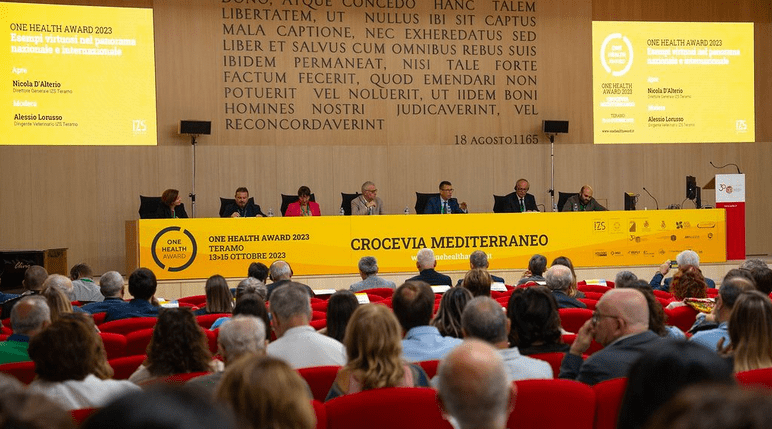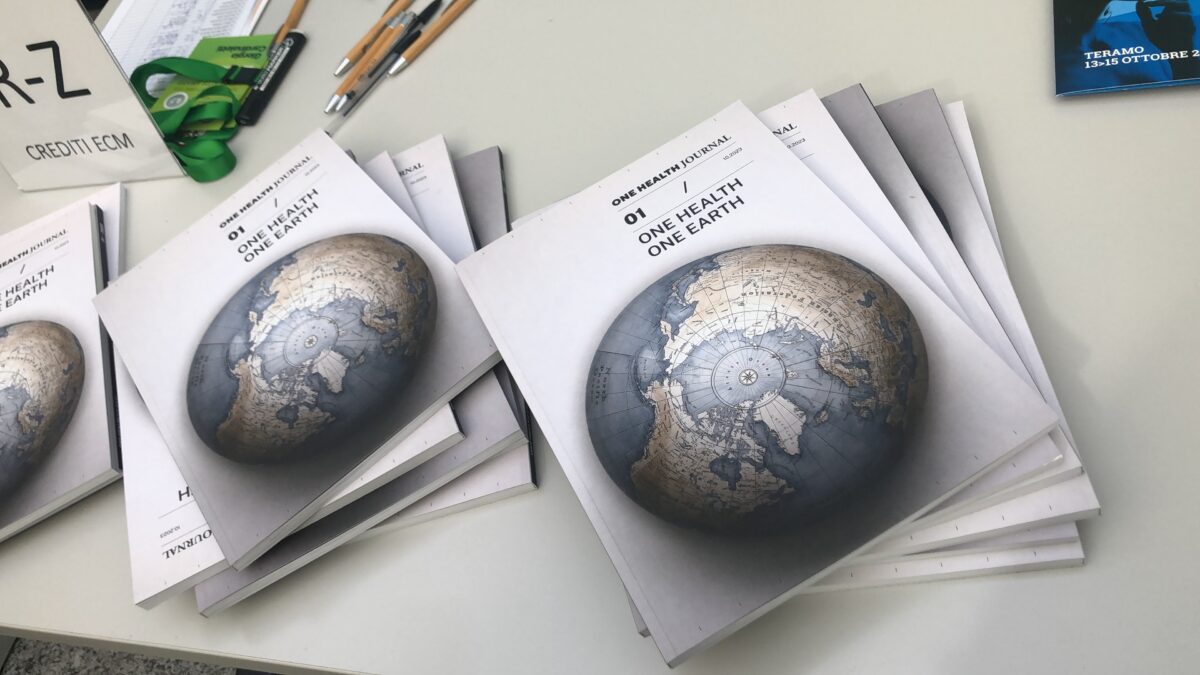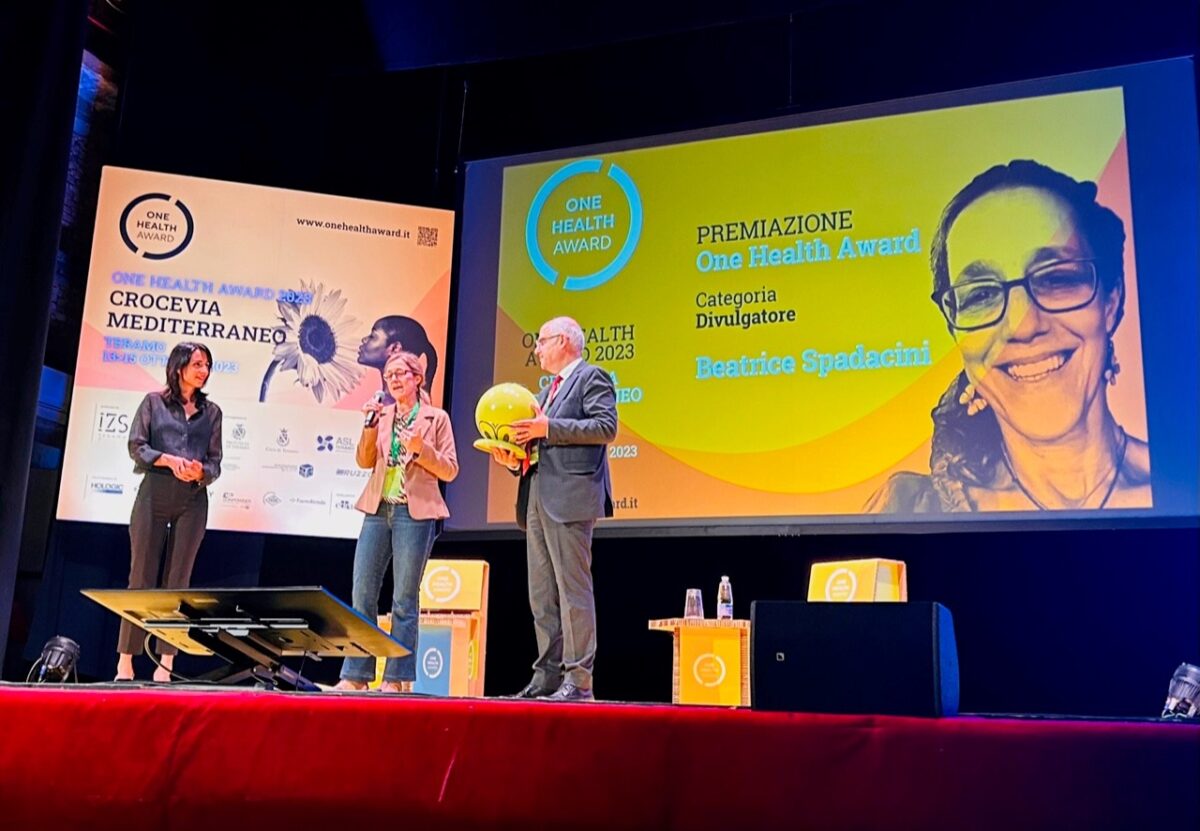By Beatrice M. Spadacini, HJN Manager

On October 14th, 2023 the Internews Health Journalism Network (HJN) received the prestigious One Health Award for its contribution to empowering journalists around the world with the tools and knowledge to cover health and science with a One Health multidisciplinary lens. The award, launched in 2022 by The Istituto Zooprofilattico Sperimentale dell’Abruzzo e del Molise (IZS) in Italy, is a deliberate effort to mainstream One Health in the public discourse, and to emphasize that human health is intimately connected to animal health and to the health of our planet.
The HJN was officially launched in 2020, at the height of the COVID-19 pandemic, when every journalist anywhere became a health journalist because of the tragic circumstances we lived through. The pandemic made it clear that animal health and human health are not separate and that preparing for the next pandemic requires a holistic approach.
An award that reflects Internews legacy
For Internews, this underscores the need for journalists to think beyond their immediate newsbeat and connect the dots across human health, animal health, climate change, food security, and even food safety. It goes without saying that the One Health award is an achievement of Internews as a whole because the HJN builds on the extraordinary work done by the organization in 100 countries over 40 years and by the Internews Earth Journalism Network (EJN), which has empowered a robust network of environmental journalists.
Internews, through the EJN and HJN, has already developed great resources to help journalists embrace the One Health approach. First and foremost, is the Internews approach to One Health reporting and storytelling, which guides journalists who want to embark on this path. Another useful resource is an in depth explainer for journalists on Antimicrobial Resistance which—as reported by scientists attending the One Health Award event in Italy—is expected to become the next pandemic and cause 10 million deaths per year by 2050. See at the bottom of this article for all available media resources on One Health.

Rebuilding Trust in Science
Many of the scientists and illustrious speakers who attended the One Health Award conference reflected on the lessons learned from the COVID-19 pandemic and referenced the exponential rise of misinformation, disinformation, and conspiracy theories that made it so much harder to manage this global health crisis. This was highlighted in how information was shared with journalists, how they interpreted it, and how this impacted the cycle of misinformation during the COVID-19 pandemic.
“At the height of the first [COVID-19] wave, communication was often times confused and contradictory,” said Dr. Anna Teresa Palamara, Chief of Emerging Infectious Diseases with the Italian National Public Health Institute. “This reflects the complex nature of the decision-making process during an emergency. Nothing is all black or all white. There are plenty of nuances, especially in a public health crisis. Mistrust towards public institutions at the height of the first wave in Italy also led to major public safety concerns.”
The topic of trust came into focus several times during the 3-day conference. Stefano Bertuzzi, CEO of the American Society for Microbiology, cited data from the Pew Research Center showing a significant decrease of trust in science by the public in the United States, with a drop from 40% of people saying they had a great deal of trust in medical doctors in 2020, to 29% in 2021. Similar data holds true for scientists in the United States and beyond.

Alessio Lorusso
Senior Veterinarian with IZSBridging the knowledge gap between experts and the public
Journalists are often considered “generalists.” In other words, they are not subject matter experts, but a good journalist should be able to produce a story about any topic. The reality is that having a specialized news beat enables a journalist to get to know the subject more intimately, understand the nuances, grasp the trends, and nurture many credible sources.
Journalists who want to integrate One Health in their reporting must be able to connect the dots and ask themselves questions that bridge different disciplines. For instance, how might a viral infection in a bird impact a mammal, and why does it matter? What might be the potential consequence on the food supply of country X, and on the economy as a whole? What is the impact of an extreme heat wave on the production of food and on human health? The analysis required for this type of reporting is much broader as are the voices of a wide range of experts.
According to Dr. Ibrahim El-Ziq, the World Health Organization (WHO) representative in Tunisia, One Health benefits from establishing national, regional, and international approaches. “We need a set of common messages at all levels. Communication is a critical tool for advocacy and accurate information is vital to ensure community engagement.” Last, but not least—he added—are investments in early warning systems and support to communities in their own settings to discourage migration, which poses risks to migrants and is a challenge for Europe.

Collaboration and partnerships are key to One Health
For centuries, the Mediterranean region has been a crossroad for people, animals, food, commercial goods, and services. Countries bordering the Mediterranean have influenced each other’s cultures, fought wars, and collaborated on joint initiatives. This unique ecosystem has also experienced many communicable disease outbreaks due to the transmission of pathogens. Historians agree that the oldest one, the Athenian plague, dates to 430 BCE.
Global travel, rapid urbanization, deforestation, changing weather patterns, and an unstable geopolitical landscape have accelerated the movement of people, animals, and vectors within countries and across borders. IZS Teramo is positioning itself as a One Health center of excellence in the Mediterranean region, precisely because it has been addressing animal health, human health, and environmental challenges with an integrated and collaborative approach for decades.
“Our cooperation activities are based on reciprocity and a collaborative strategy,” said Nicola d’Alterio, Executive Director of IZS. “This approach has guided us for years in the creation of international partnerships and networks with a goal of global health, while addressing he needs of the most vulnerable populations of the Global South and the relationships between their health, the health of their animals, and of the environment where they live.”
The collaboration with the Internews Health Journalism Network began at the end of 2022 when two IZS veterinarians spoke to a group of African journalists who are committed to reporting on vulnerable populations and elevating their voices. We soon realized that our goal of mainstreaming One Health into the public discourse is aligned.
The vets shared how animal health impacts not only human health, but also food security and livelihoods. Our journalists understood the important role that veterinarians play in promoting the One Health approach. Afterall, Internews has been at the forefront of this movement for a decade, especially through our Trust Framework, which analyzes drivers of trust [and mistrust] in any information ecosystem. Connecting journalists to health experts and equipping them with the tools to fact-check and conduct quality reporting are some of the ways we build trust.
The One Health award is a statement that IZS Teramo recognizes the value of partnering with media professionals to position One Health as a sustainable way forward for our planet. Internews is thrilled to continue to empower journalists to report on One Health. What started as a fortuitous meeting in 2022, is forging new partnerships and collaborations.
One Health resources for journalists
- From Animals to Humans online course to report on zoonotic diseases and their environmental origins
- Journalism for One Health: The Internews Approach
- A journalist’s guide to covering and implementing the One Health approach in reporting
- A journalist’s guide to covering zoonotic diseases
- A media toolkit for reporting on Mpox
- Antimicrobial resistance: an in-depth explainer for journalists
- 10 Key takeaways for journalists covering One Health: Soundbites from the 2022 World Conference on One Health